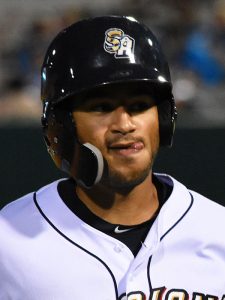#Jackie42 pic.twitter.com/b8F9wIMLRr
— Los Angeles Dodgers (@Dodgers) April 15, 2023
By Jerry Briggs
Special for The JB Replay
As Major League Baseball celebrates Jackie Robinson Day, some in the state of Texas are wondering about the current state of affairs with the national pastime.
What exactly is the issue?

Online data indicates that San Diego Padres outfielder Trent Grisham (above) is one of only nine athletes from Texas high schools or colleges in Major League Baseball. – File photo by Joe Alexander
Well, it is likely that only nine African-Americans with roots in Texas high school and college baseball have played in major league games through the first few weeks of this season, according to biographical data and photographs of the athletes available online.
Based on research conducted over the past month by The JB Replay, a total of 68 athletes from high schools or colleges in the state have either played in a game or have been on an active MLB roster since the season opened on March 30.
Within those 68 biographies posted online, photos of only nine African Americans were found.
San Antonio’s Fred Battles, the father of Tampa Bay Rays prospect Jalen Battles, expressed dismay with the findings in the report. Though he has long suspected that few African Americans from Texas have been making major-league rosters lately, the statistics unveiled this week surprised him.
“It’s shocking,” said Battles, a former basketball player at Judson High School, whose son Jalen attended Madison. “It’s bad. There has to be a way we can figure this out.”
Major League Baseball fields 30 teams. Each team has 26 spots on active rosters through the end of August. So, in essence, there are 780 jobs available in MLB at the moment, not counting players on the injured list.
Here are the names of MLB’s active African-American players with roots in Texas high schools or colleges, according to the The JB Replay’s analysis:
* Josh Bell, Cleveland Guardians designated hitter from Dallas Jesuit Prep
* Trent Grisham, San Diego Padres outfielder from Richland.
* Darik Hall, Philadelphia Phillies first baseman from Dallas Baptist University
* Ke’Bryan Hayes, Pittsburgh Pirates third baseman from Tomball Concordia Lutheran
* Taylor Hearn, Texas Rangers pitcher from Royse City
* Jordan Hicks, St. Louis Cardinals pitcher from Cypress Creek
* Corey Julks, Houston Astros outfielder from Friendswood
* Gregory Stone Garrett, Washington Nationals outfielder from Richmond George Ranch
* Canaan Smith-Njigba, Pittsburgh Pirates outfielder from Rockwall-Heath.
In a story published Friday, USA Today found that only 6.1% of MLB players on this year’s opening-day rosters are black, 58 of the 945 players on the active, injured and restricted lists, the smallest percentage since 1955.
It’s hard to say if the numbers of African-Americans ball players from Texas have decreased, as well. But it is surprising that a sports-crazy state with vibrant population centers in Houston, Dallas-Fort Worth, Austin and San Antonio has fewer than 10 black athletes in all of the major leagues.
Battles tied both social and financial issues to the popularity of youth baseball among black kids in Texas.
“My initial reaction is, when (Texas athletes) are younger, we don’t have anyone pushing baseball,” Battles said. “In the other sports it’s so much easier, financial-wise. It’s easier to go out and find a basketball and find a basketball court. Or, to find a football field. A little football costs $15.
“In baseball, a bat is $300. A glove is $200. To play, you have to find a field, and it’s hard to find a baseball field to play. Especially in the inner city. You’re not going to find one worth playing on.”
Houston-based minister Ray Mackey III, whose great uncle was Negro Leagues star Biz Mackey, said MLB can do more to promote the game to African-American youth.
“It’s a work in progress, if I may frame it that way,” Mackey said. “MLB is still not at a level of doing all that could be done to help cultivate African Americans into the sport. I’m not talking necessarily into (the majors) but just into the sport itself.”
Robinson emerged as the first black athlete to play in MLB since the late 1800s when he took the field for the Brooklyn Dodgers in 1947. Throughout his career, Robinson distinguished himself not only with his talent and exciting play, but also with the restraint he showed in the face of racial prejudice. He hit .311 for his career.
Biz Mackey, from Luling, played for a short time with the San Antonio Black Aces in the early 1900s and then moved on to a long career in the major leagues of black baseball as both a player and manager.
Along with Josh Gibson and Roy Campanella, Mackey is regarded as one of the greatest catchers in Negro Leagues history. He was inducted into the Hall of Fame in Cooperstown in 2006.
